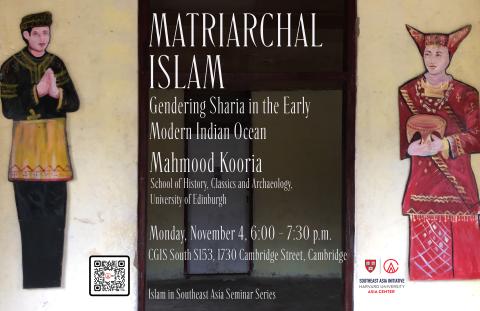Matriarchal Islam: Gendering Sharia in the Early Modern Indian Ocean
Mahmood Kooria, School of History, Classics and Archaeology, University of Edinburgh, UK
RSVP not required, but appreciated.

Millions of Muslims from Mozambique to Indonesia historically followed a social system in which women held significant influence over family, community, and broader cultural traditions. Beginning in the nineteenth century, many Arabian and European jurists critiqued them as un-Islamic or unnatural, contending that women heading families contradicted what they saw as Islamic or natural laws. Yet, diverse forms of matrilineal, matrifocal, and matriarchal systems flourished among Muslims in Indonesia, Malaysia, India, Sri Lanka, the Comoros, and Mozambique. Despite their geographical distances, they were bound together by the Indian Ocean world. This system also served as a practical structure for engaging in maritime commerce, enabling men to go on voyages as merchants, sailors, and itinerants, while women managed property, households, and social affairs. Such economic and social stability empowered women with decision-making in personal and economic matters. This talk explores this matriarchal-maritime continuum, examining its role in family, community, and economic life from the sixteenth to the eighteenth centuries, prior to the widespread challenges to these practices. It further investigates how this system supported the mercantile networks of the Indian Ocean and contributed to the spread of Islam, offering a different perspective to interpretations of its societies as patriarchal and patrilineal.
Mahmood Kooria is a Lecturer in the History of the Indian Ocean World at the University of Edinburgh’s Department of History, Scotland. Previously, he has held teaching and research positions at Leiden University (the Netherlands), University of Bergen (Norway), Ashoka University (India), National Islamic University Jakarta (Indonesia), International Institute for Asian Studies (IIAS), the African Studies Centre Leiden (ASCL), and the Dutch Institute in Morocco (NIMAR). His research focuses on the premodern Indian Ocean world, Afro-Asian connections, matriarchal and matrilineal Muslim societies, and Islamic legal history. He has authored Islamic Law in Circulation: Shafi`i Texts across the Indian Ocean and the Mediterranean (Cambridge, 2022), and co-edited Malabar in the Indian Ocean World: Cosmopolitanism in a Maritime Historical Region (Oxford, 2018) and Islamic Law in the Indian Ocean: Texts, Ideas, and Practices (Routledge, 2022).



